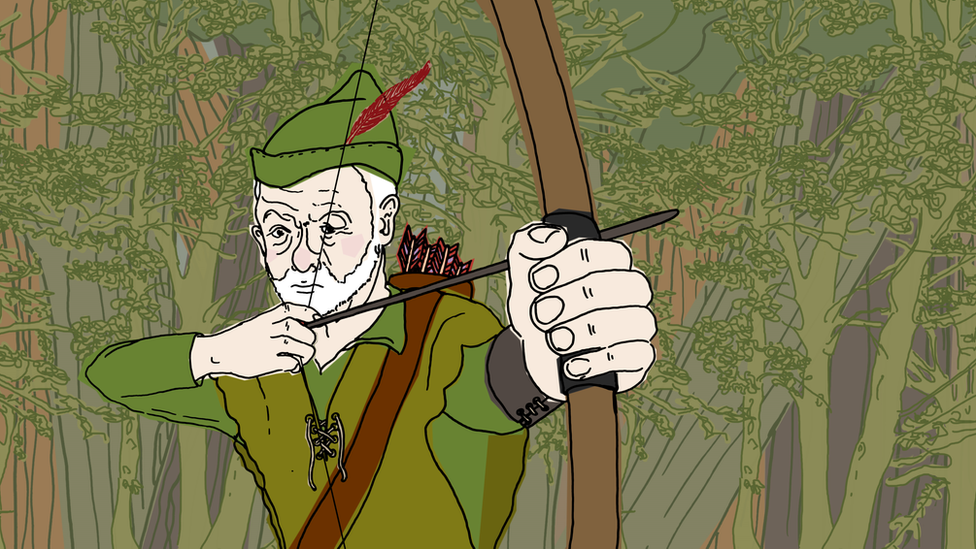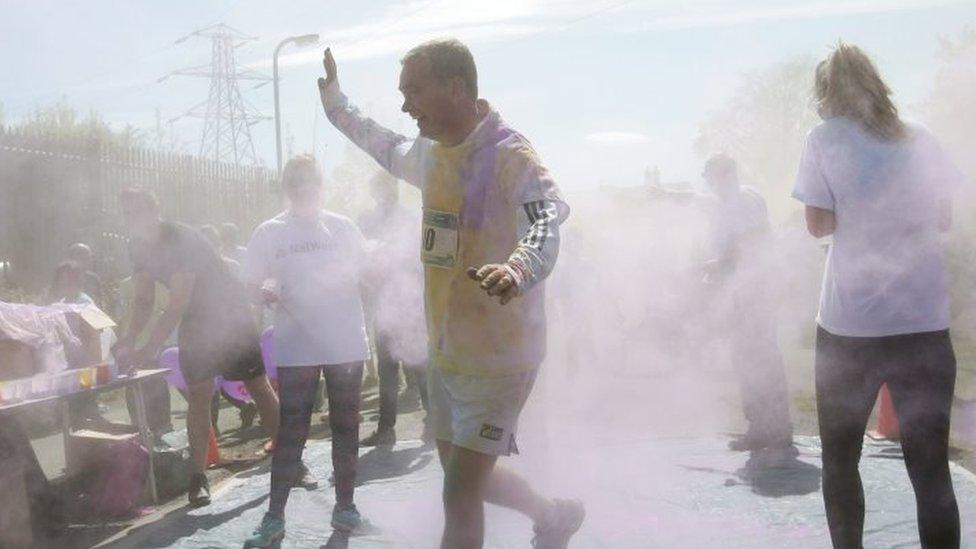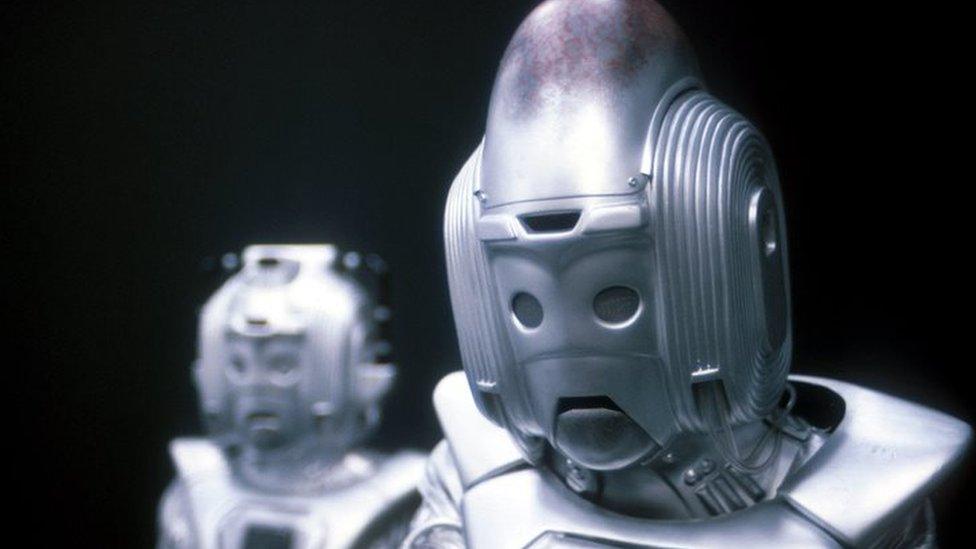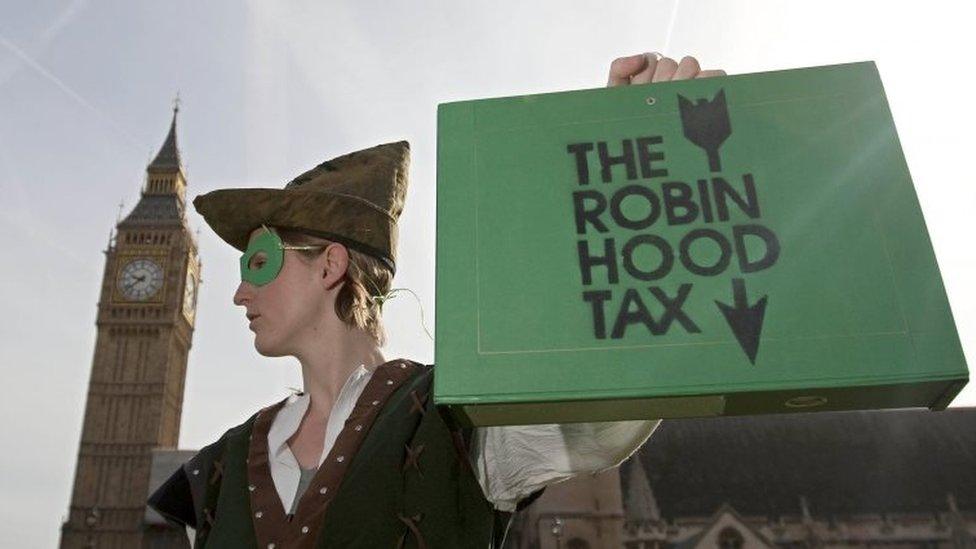Election Lexicon: Robin Hood tax, cockroaches and Heineken politician
- Published

Every general election throws up buzzwords and curiosities which help to define the tenor of the campaign. Which words have caught the ear in week two of the 2017 contest?
Heineken politician
A curious thing is happening. Commentators from left and right, and some candidates, have been referring to Theresa May as a Heineken politician. That phrase must mean something very different this time around.
The reference is to an advertising slogan which ran for three decades and which has been credited with moving UK tastes from bitter to lager.
It was the result of ad man Terry Lovelock staring, for days on end, at a yellow card with a client brief so terse it consisted of a single word: REFRESHMENT.
"After about six weeks," Lovelock recalled, "I was ready to chuck myself out the window." Happily, he instead coined the phrase "Heineken refreshes the parts other beers cannot reach".
And so, until very recently, a "Heineken politician" has been one who tickles a party base with the kind of antics that a leader must shun in favour of a "Ronseal" approach; it's been used to describe Boris Johnson for the best part of a decade, though he doubtless prefers to distance himself from alcohol associations for the time being.
It tells us something about the level of levity in the campaign so far that it's being applied to the steady-as-she-goes prime minister; anyone awaiting such antics as Labour's undoubted all-time Heineken politician John Prescott walloping an egg-hurling protestor in Rhyl in 2001 seems likely to remain unreached and under-refreshed.
(With the possible exceptions of the Mayllennials - see below.)
Cockroach

Tim Farron takes everything that's thrown at him at a novelty fun run
The Lib Dems were likened this week to cockroaches, which offers a rare opportunity to recount why that particular insect has that peculiar name.
First came the cockroaches' own chirping sound. Then Spanish speakers came up with "cucaracha", an imitation of that chirp. And then Captain John Smith - the explorer of the Caribbean with a very English name, and lover of Pocahontas. He heard the Spanish word and made it sound less Spanish by giving it the head of a cock (as in poultry) and the tail of a roach (as in fish).
So when you say "cockroach", you're mimicking an Englishman impersonating a Spaniard imitating the nocturnal orthopteron itself.
And if you're concerned about any political party being portrayed as pestilence, rest assured: the description came from one T Farron, alluding to the popular idea that cockroaches have the resilience to make it through a nuclear holocaust.
Cyber

Why didn't we listen to Dr Who?
The cyber attacks on the NHS rapidly became part of this week's campaigning in the form of angry exchanges over funding and responsibility.
Cyber is an especially unlovely word, usually deployed to describe unlovely things. Once, it was a happy little Greek term for a steersman, adapted in the 1940s by scientists describing the interaction between humans and machines: cybernetics.
From there, we got the science-fiction word for virtual reality, "cyberspace" and for an optimistic while, "cyber" was a harmless if twee way of making things sound more exciting than they often turned out to be. In 1990s' editions of the Radio Times, we read of such things as:
The Kit: the interactive internet club for kids, live from the BBC Cybercafe
The Web: Michaela Strachan takes a cyber safari
Night Waves: a new production transplants [opera character Carmen] to the 21st Century as queen of the cyber chicks
That was then. In this century's use of "cyber", those cafes, chicks and safaris have been supplanted by bullying, crime, warfare, terrorism and attacks.
Perhaps Doctor Who was right all along to be sceptical about cyber.
Meanwhile, e- has taken over as the prefix for those things in the digital world which are less malign - depending, that is, on your feelings about email.
Mayllenials
It was also in the 1990s that we gained the word millennials, to describe the generation after Generation X: the ones who would come of age around the millennium.
It was coined by Neil Howe and William Strauss in a book with a title which again suggests that the future seemed rosier back then: Millennials Rising: The Next Great Generation. The future, it said, was theirs for the taking.
"Millennial" tends now to be used in the context of articles about people whose closest brushes with home ownership or stable employment is through watching period drama.
But it's also a shorthand for those who use social media avidly - especially whimsically. (Incidentally, readers who are baffled by such headlines as "Snapchat launches election geofilter" may not ever need to understand the words at either end.)
And so, inevitably, to the Mayllennials. Last election, we witnessed #milifandom: the practice of taking culture's most inspiring and arousing images, and inserting the face of Ed Miliband.
Now it's the turn of Theresa May. "You've got young people supporting her. In fact you may consider her the UK's Justin Trudeau," the creator of the itsgonnabetmay, external Instagram account tells Buzzfeed, external.
Three cheers, then, from Conservative central office for this groundswell of unbridled passion for the party? Perhaps two cheers; the prime mover of Mayllennialism clarifies: "I'm mostly interested in TM and she's the reason I tolerate the Tories."
Robin Hood

A new name for an old idea?
Labour's proposed tax on City transactions is an idea that has had many names. Economists who prefer initialisms talk of FTTs (financial transaction taxes). Those who wish to tip their hats to a Nobel-winning colleague might instead discuss a Tobin tax. In politics, it needs a snappier moniker: step forward the Robin Hood tax.
Putting aside the economics, what "Robin Hood tax" gains in catchiness, it loses in coherence: Robin Hood is, after all, an outlaw, and for centuries the metaphor has been used for predominantly illegal activity. If, however, you're operating within legal bounds, you're not really a Robin Hood at all, and may not even be very merry: you're a civil servant, most likely at HM Revenue and Customs.
The Lib Dems launched their own manifesto on the basis that the election is the last chance saloon for any voters hoping for a Brexit rethink, evoking a popular name for 19th Century American bars located right by an area where alcohol couldn't be bought, in an early example of branding via unique selling point. Oddly, the phrase is used far more here than it is in the US, especially when it comes to sport teams on their uppers.
Finally, for now, some new pieces of language from the manifestos themselves.
Some are old terms flipped on their heads: from "buy-to-let", we have the Lib Dems' *rent-to-buy*, and reversing outsourcing, Labour's insourcing.
Others are entirely new, like the Greens' introduction of period poverty to political language. All duly noted in the grand ledgers of Election Lexicon.